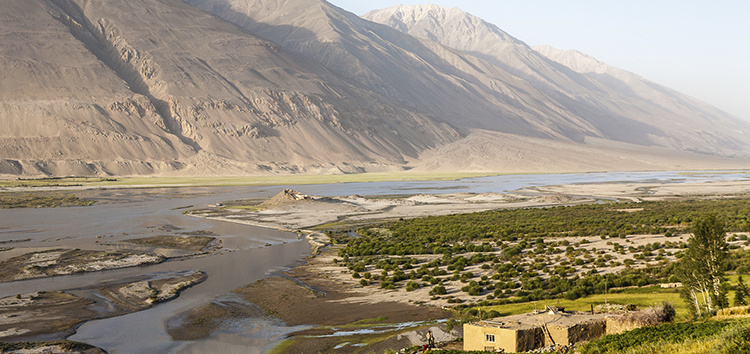Households and businesses to benefit from programme combining finance and innovation
Most of us probably “don’t know much about Tajikistan” (to paraphrase a famous song). That’s a mistake. Tajikistan, a former Soviet republic, is a country in Central Asia with spectacular mountains, gorges and waterfalls. In the Pamir Mountains, the “Roof of the World”, legend has it that the best carpets in the world are being made.
What we should also know about Tajikistan, however, is that it is amongst the most vulnerable countries to climate change in the world. Tajikistan’s climate is changing drastically.
Average temperatures are rising, precipitation patterns are shifting and glaciers are retreating.
This has an enormous impact on the economy – which is dominated by the agricultural sector. Agriculture accounts for one quarter of the country’s GDP and two thirds of the working population. Tajikistan’s businesses and, most importantly, the country’s population are also affected by climate change.
To tackle this crucial issue the EBRD has teamed up with the Pilot Program for Climate Resilience of the Climate Investment Funds (CIF) and launched a new facility which combines financing with innovation.
Under the US$10 million Tajikistan Climate Resilience Financing Facility, a.k.a. CLIMADAPT, local partner banks will provide loans to local households and small businesses for investments in climate change resilience.
Climate resilience investments are investments that aim to rationalise water and energy use and promote sustainable land management. In the agricultural sector this can include drip irrigation and zero tillage.
Zero tillage is a practice of growing crops from year to year without disturbing the soil through tillage. It increases the amount of water that infiltrates into the soil. This can reduce or even eliminate soil erosion.
Tajikistan’s farm land – which is scarce in any case – has long suffered from degradation, especially erosion. This is due to natural factors, but also anthropogenic factors such as inappropriate land management and over-grazing. Climate change is exacerbating the situation.
Zero tillage and other climate resilience technologies are new to Tajikistan. CLIMADAPT will support suppliers of such climate resilience technologies.
Financing climate resilience technologies is also new to local financial institutions. Therefore, CLIMADAPT will support partner financial institutions adding this activity to their banking operations.
This support in the form of technical assistance is funded by UK’s Department For International Development and the EBRD’s Early Transition Fund. Climate resilience investments are also new to farmers, businesses and households.
So CLIMADAPT offers climate resilience assessments which support clients in recognising climate risks and finding appropriate technical solutions.
There is another cause for erosion and it is largely man-made. A lack of electricity has forced the local population to chop wood for heating. This has led to deforestation and further erosion.
Tajikistan’s power generation relies almost entirely on outdated hydro power plants and the sector has come under enormous pressure because water inflows are changing due to altering precipitation patterns and retrieving glaciers. Frequent power cuts are damaging the country’s economy.
In this area too, Tajikistan is working with the international community to address these challenges. Last year the country – supported by the EBRD, CIF, UKAID and Austria – started a major modernisation programme of its hydro power sector.
The first project, financed by the EBRD, is the refurbishment of the Qairokkum hydro power plant addressing effects of climate change. Experts developed different water inflow scenarios for the reservoir based on various climate scenarios. This analysis helped to determine the optimal technical solution for the hydropower modernisation.
After all, there is a lot to know about Tajikistan.




